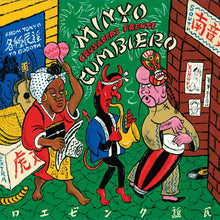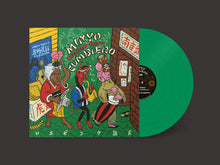Mais Um Discos / US & Europe / 2021 / LP, Green, Clear.
Tokyo-based ten-piece and wild Japanese folk-song fusionists, Minyo Crusaders join forces with Colombian cumbia radicals Frente Cumbiero on Minyo Cumbiero, a collaborative release that fuses ancient Japanese folk songs with heavyweight Colombian styles.
Recorded across two days in Bogota in August 2019 Minyo Cumbiero includes versions of an ancient Japanese rap tune, modern cumbia standard and 1980s’ Chinese computer game theme-song and captures a thrilling exchange between two radical and triumphant groups. Japan and Colombia may be cultural opposites on different sides of the world, yet the countries are bursting at the seams musically and on this EP both groups stridently drive their respective music cultures and histories in exciting new directions with powerhouse horn sections, rippling dub basslines and rampant Afro-Latin polyrhythms creating carnival grooves, released here via London-based label, Mais Um.
For an uncompromisingly contemporary and inventive take on traditional Colombian cumbia, look no further than Frente Cumbiero. Headed by Colombian songwriter and producer Mario Galeano Toro (also a founding member of Ondatrópica and Los Pirañas), the Bogota-based crew have spearheaded Colombia’s thriving new-look cumbia movement for well over a decade, fusing cumbia rhythms and bass weight electronics with releases featuring collaborations with the legendary London-based dub producer, Mad Professor and US-based Kronos Quartet.
Following the release of their acclaimed debut album, Echoes of Japan in 2019, Minyo Crusaders - or MinCru as their Japanese fans know them as – have won-over a global audience with their unique take on Japanese folk music. A debut debut European tour in 2019 saw main-stage performances at Le Guess Who and Transmusicales and was soon followed by shows at WOMADelaide and WOMAD New Zealand in early 2020 that saw audiences intoxicated by their mix of traditional Japanese folk songs (min’yō) and Afro-funk, Thai pop, Ethio-jazz and reggae. Fronted by singers “Freddy” Tsukamoto (his nickname comes from his hero, Freddie Mercury) and Megu, with guitarist and bandleader Katsumi Tanaka, the members of the ten-piece are drawn from Tokyo’s vibrant and diverse jazz and Afro-Latin scenes.
Having met in 2018 at Japan’s Fuji Rock Festival Mario invited Minyo Crusaders to Bogota in 2019 to perform at a local festival and record this EP. “I was really amazed how well they put together these ancient songs from Japan with Caribbean rhythms” says Mario. “You can really tell the high sensibility they have for being able to hear what are the meeting points between different vocal traditions, African, Latin American styles: they were fearless in trying to take this forward. It was also great to find tropical souls in Japan and see how much we have in common musically”. Katsumi from Minyo Crusaders adds: “Putting this record together with Frente Cumbiero was very exciting. We recorded over 2 days. The 1st day we ate. The 2nd day we recorded. It was a really nice atmosphere - a true cultural fusion. Now we are family”.
The EP opens with a wild version of the theme song from trailblazing Chinese kung-fu computer game Yie Ar Kung-Fu Retitled Un Dos Kung Fu the original computerised 8-bit casio synth-track is flipped into a chicha and salsa-styled boogaloo. Cumbia Del Monte Fuji is a reworking of Pedro Laza’s classic version of Pascual Rovira’s Cumbia Del Monte, where triumphant horns ride over a cumbia rhythm that shoots skywards when Megu’s vocals drop.
Tora Joe (Tiger Woman) and Opekepe are both ancient Japanese festival songs with Tora Joe given a Shangaan-electro style beat turning it into a 158bpm canival raver, whilst the bubbling dancehall-reggaeton beat, rumbling dub FX and beguiling flute hook offer a modern take on Opekepe, which Katsumi from Minyo Crusaders believes is the oldest Japanese rap song, the rap here delivered by Frente Cumbiero’s Sebastián Rozo.
“This was one of the best recording sessions we have had. Everyone was so happy and uplifted. The microphones captured not just the sound, but the vibes of the people and the energy. This is why when you listen to these tracks, you feel that positivity and power”, adds Mario.




